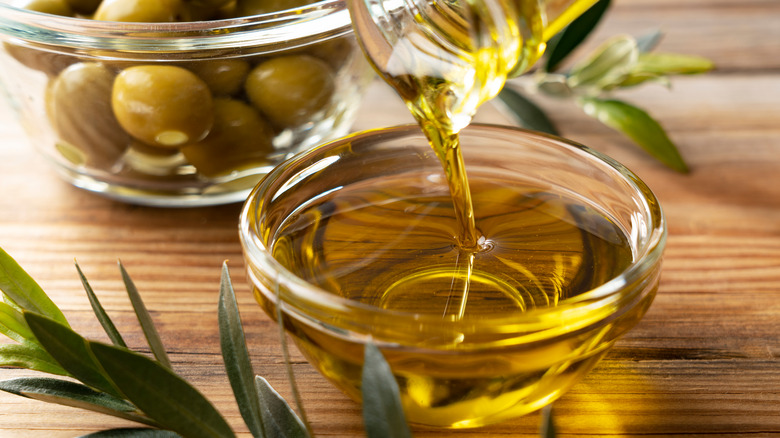The Type Of Oil You Should Use In Salad Dressing
Many salads require some type of fat to hold the greens together; otherwise, you'd be left with limp vegetables sitting in a sauce rather than evenly coated in it. To get a restaurant-quality salad, you have to understand the standard vinaigrette ratio provided by Bon Appétit: 3/4 oil to 1/4 part vinegar or acid. In fact, fats are vital components in all types of salad dressings, including cream-based sauces like ranch, aiolis, and vinaigrettes. For vinaigrettes, in particular, you want to pick an oil that will give you flavor — after all, it'll make up 3/4 of your dressing.
First, let's discuss the different oil types available to us. There are unrefined and refined oils, which have different uses in the kitchen due to their quality, taste, and smoking point. According to the Harvard School of Public Health, unrefined oils are generally cold-pressed and aren't extracted with heat or chemical solvents.
This means that the oils are mechanically pressed and unprocessed, which helps them keep their flavor, nutrients, and healthy fats. Some unrefined oils you would find at the store are extra virgin olive oil, coconut oil, and sesame oil. On the other hand, refined oils are made from crushed plants or seeds, which are then extracted with a chemical and deodorized. Commonly used refined oils include canola oil, rapeseed oil, vegetable oil, and soybean oil.
Unrefined oils are the best
Considering taste and utility, unrefined oils are the best types to use in your salad dressing. As mentioned earlier, these retain their flavor and nutrients because are not chemically altered or heated. In addition, oils like extra virgin olive oil and sesame oil are wonderful combining agents for salads due to their flavor and viscosity. Whether it be with the savory, nutty flavor of sesame oil or the grassy notes of extra virgin olive oil, your salads can really stand out if you use the right kind.
Unrefined oils also work better on salads due to their low smoke point, which is the temperature at which the fat breaks down and releases free radicals that can be cancerous, per The Seattle Times. Unrefined oils should be reserved for dressings or drizzles since they have smoke points ranging from 225°F to 350°F, according to Cooking for Engineers. On the other hand, refined oils like avocado oil have a smoke point of 520°F.
All in all, refined and unrefined oils each have their place in the kitchen. Additionally, unrefined oils such as extra virgin olive oil and sesame oil contain monosaturated fats that are beneficial for heart health because they lower LDL (bad) cholesterol (via MedlinePlus). So the next time you want to make a salad, use these unrefined oil-based salad dressing recipes that include some unexpected spices and herbs.

